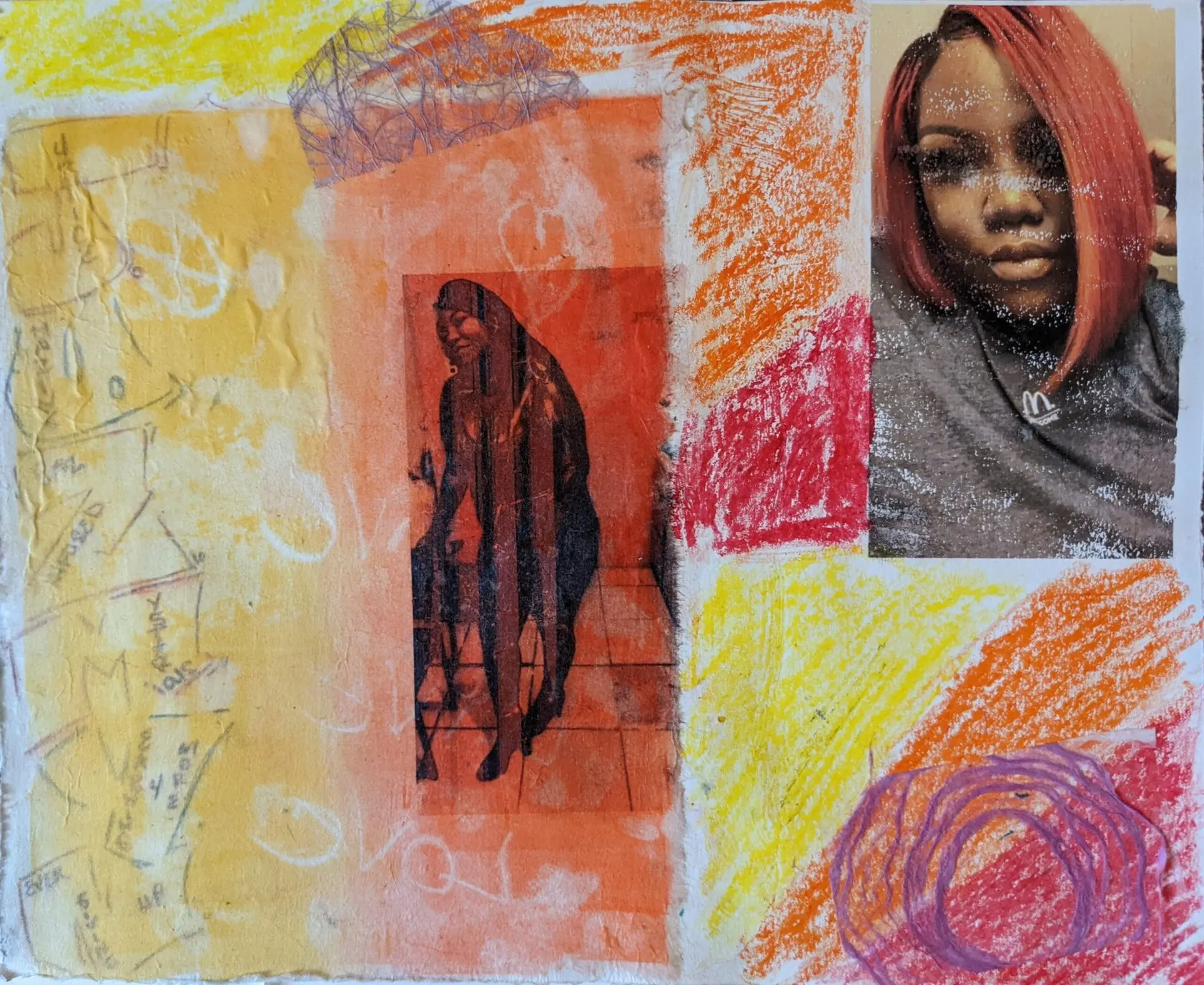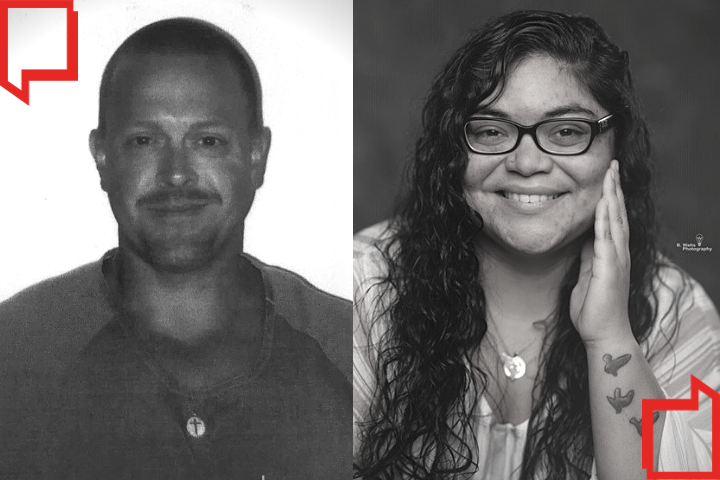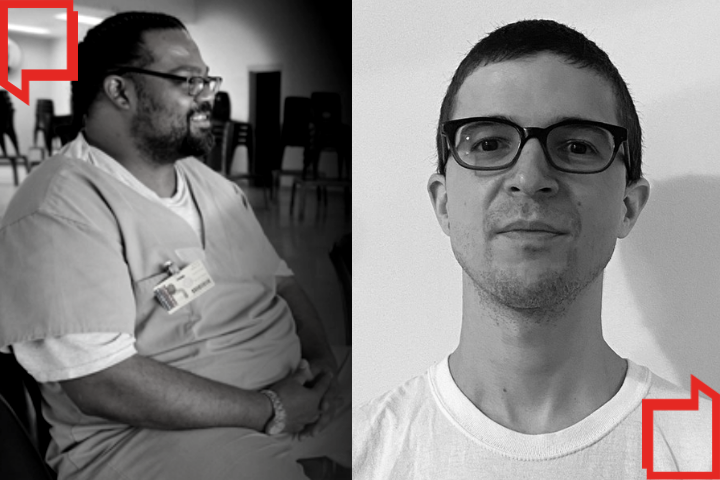Alex Friedmann was awarded 1st Place in Drama in the 2022 Prison Writing Contest.
Every year, hundreds of imprisoned people from around the country submit poetry, fiction, nonfiction, and dramatic works to PEN America’s Prison Writing Contest, one of the few outlets of free expression for the country’s incarcerated population.
Production Notes:
This play is intended for a small theater with an audience in the center section only, directly in front of the stage set. It involves short acts of one to two minutes in length, separated by brief periods of darkness (30-60 seconds), during which set and costume changes are made. Stage lighting should illuminate the cell set only, center stage; when those lights are off, the entire theater should be dark. Since set changes must be done in darkness, stage hands will need to use infrared or night vision devices. One stage hand, working quickly, should be able to make the set changes.
Stage Set:
A prison cell is situated center stage, just behind the curtain fall if the theater has a curtain, or six feet back from the stage edge if not. Set directions are from the perspective of the audience facing the stage. The cell is approximately 15’ wide by 10’ long, with walls 8’ high. The front of the cell, with the cell door, is farthest from the audience; the “back” of the cell, which is open, is closest to the audience. The walls should look like concrete blocks, painted white. The door, which needs to be sturdy (it will be kicked), is made of steel, painted gray. It has a food slot mid-door with a cover that can be opened and closed from outside the cell, and a 1’ by 3’ approx. observation window, offset to the right. The door opens to the outside of the cell (not inward). There is a steel bunk and shelf on the left of the cell, and a combo toilet/sink painted silver, to simulate steel, on the right wall near the front of the cell. The right wall has an offset alcove with a stool and table to the rear of the cell, and a shower head and shower button are in the middle of the right wall. A drain is in the middle of the floor; if running water is used for the shower in Act 5, then the set should be elevated 1 to 2 inches above the stage, so the water can drain into a flat basin concealed under the cell floor, for later disposal. If water is used, a hose needs to be attached to the sprinkler head outside the cell, where water can be turned on or off from outside the cell. The floor of the cell is painted dark gray. To either side of the cell set, black barriers should extend all the way to stage left and right, to conceal movements behind the set. See set design diagrams. All action except the final Act takes place within the confines of the cell, with the open side closest to the audience being the invisible rear “wall.”
Cast:
- “Leon,” inmate. This role is best played by twins, so one can be prepped with costume changes while the other is onstage, then they swap positions between Acts. The role can be performed by a single actor if he can quickly make the necessary costume changes on set in the dark between Acts. It would be easier with twins, though, and an impressive reveal for the audience at the conclusion of the play, at curtain call. The actor(s) should have very short hair or be bald, and be clean-shaven.
- Guards 1, 2, 3, and 4. All wearing similar uniforms—gray, dark blue or black.
- Announcer. To do readings/voice overs during or between the Acts.
Screenplay/Directions:
[All theater lights off, except stage center, directed at stage set.]
Curtain up, if theater has curtain.
Initial cell set-up: Cell door is closed. Cell is empty except a plastic-covered mattress on the bunk, with a folded white sheet and brown or light gray blanket, also folded, on the mattress.
Initial costuming: Leon is wearing an orange jumpsuit, fastened in front, fastened up to his neck; he is wearing flip flops or orange crocs, has short hair (or hairpiece), and is clean-shaven.
Act I
Announcer (always offstage; during action below): “An estimated 55,000 to 62,000 prisoners are held in solitary confinement, based on incomplete date, in local jails, state and federal prisons, ICE detention centers, juvenile facilities and other places of imprisonment in the United States. Over 10,000 are in Florida alone, according to a lawsuit filed in 2018 by the Southern Poverty Law Center, and around 3,000 are in Michigan according to a February 2021 report by Citizens for Prison Reform. Solitary goes by many names, including segregated confinement, restricted housing, administrative segregation or ad seg, and punitive or disciplinary segregation. Seg units are called Secure Housing Units, or SHUs (pronounced ‘shoes’), Special Management Units, or SMUs, or maximum security or supermax units. They all share similar conditions, such as keeping prisoners locked in their cells 22 to 24 hours a day, for time periods ranging from a few days to decades. Leon is one such prisoner, as he enters solitary confinement on Day 1.”
Action: (during announcer dialogue) – Cell door opens and Leon enters the cell with hands cuffed behind his back; Guards 1 and 2 can be seen behind him in the doorway. They shut the door with a loud metallic clang. Leon stands to the left of the door, in profile to audience. The food slot in the door opens, and Leon backs up to it, to have the cuffs removed. Once the cuffs are off, Leon rubs his wrists and moves to the center of the cell, as food slot cover slams shut. He looks around the cell, under the table and bunk, then flushes the toilet (flushing sound). Note—a dummy button on the side of the toilet/sink is used to “flush” the commode. Leon picks up the blanket, puts it on the table, then unfolds the sheet and spreads it over the mattress. He lifts up one end of the mattress and ties two corners of the sheet behind it in a knot, then does the same to the other end. He picks up the blanked and spreads it over the bed, tucks in the edges, and lies down on the bunk, feet towards the audience, hands behind his head, looking upwards.
[After announcer and action are done, stage lights off].
Act 2
Set changes – Mesh laundry bags with a few white and gray clothes are now at foot of bed, closest to audience. Two paperback books are on tables (“King Rat” by Clavell and “Grapes of Wrath” by Steinbeck). A few white towels are folded on the shelf. Soap, deodorant are on the sink.
Actor changes – Leon’s orange jumpsuit is pulled down to the waist; he wears a white t-shirt.
Announcer (while lights off): “Although solitary is supposed to be used for the worst or most dangerous offenders, that is not always the case. Prisoners can be put in segregation for a variety of reasons, including minor violations, misbehavior due to mental illness, and “pending investigation” for supposed disciplinary infractions. Until June 2019, for example, prisoners in the ShaKopee Women’s Facility in Minnesota were placed in ad seg for shaking hands with or patting the back of another prisoner, under a strict “no touching” rule. And in June 2021, Virginia officials settled a lawsuit filed by Nicolas Reyes, who spent 12 years in solitary, mostly because he didn’t speak English, and thus could not complete program requirements, which included keeping a written journal, to move to a lower security level. Day 20.” (Note—announcement is referred to as voice-over, or VO).
[Stage lights on]
Action: Leon is crouched down next to the cell door, in profile to audience, facing toilet. The food slot in the door is open, and a phone card with a receiver attached protrudes through the slot. Leon is speaking on the phone; only his voice is heard.
Leon: “Yeah baby, it was crazy. We were on the yard, and a couple of gang members jumped this CO right next to me and started beating the shit out of him. They called in a code and put everyone on the ground, and locked a bunch of us up. (Pause). No way, baby, I wasn’t any part of it; I was just there when it went down. (Pause). They fucked him up pretty bad—they had to call an ambulance. (Pause). No, once they look at the video, they’ll see it wasn’t me. But while I’m here I can only make one call a month, so I’ll write you instead. It’s OK baby, I love you. (Pause). I miss you, too.
[Stage lights off].
Act 3
Set changes – Two more books on table (“The Good Earth” by Buck, “Man’s Search for Meaning” by Frankl); more clothes in laundry bag, and folded on shelf. Bed is unmade, and there is a large photo of a woman (wife/girlfriend) on the wall at the poster location, above the stool.
Actor changes – Leon is wearing white t-shirt and sweatpants, and slip-on tennis shoes (the orange jumpsuit will no longer be used). He has light beard stubble.
[Stage lights on]
Announcer (during action below): “The first prison in the United States, the Eastern State Penitentiary, opened in 1829 and was based on the use of solitary confinement and enforced silence for all prisoners. The concept was developed by the Quakers, who believed that solitude and study of the Bible would cause offenders to become penitent—hence the name penitentiary. Eastern State moved away from the solitary confinement model; it closed in 1971, and was turned into a tourist attraction.” “Day 92.”
Action: Leon is exercising during the voiceover (VO). He does a dozen quick pushups, facing the audience, then a dozen squats, then a dozen steps up/down on the stool. He is silent.
[After VO and action is done, stage lights off].
Act 4
Set changes – Stack of magazines has been added to table; towel hangs from shelf; plastic cup on table.
Actor changes – Same clothes; slightly longer hair (or braids/dreads); heavier beard stubble
[Stage lights on]
Announcer (during action below): “Prisoners in segregation units can sometimes interact with other prisoners by “fishing” under the crack at the bottom of their cell door, using thin strips torn from a sheet tied together, an attached to a piece of card board or a flat plastic bag stuffed with wet paper towels. By using their fishing line to catch a line from another cell, they can trade magazines, books that are torn into sections small enough to fit under the door, food such as bags of crushed ramen, and even drinks and hot water in zip-lock bags or tied-off rubber gloves. Of course, drugs and homemade alcohol, which are also available in seg units, can be obtained using the same method. Skilled fishers can cast a line under their door from one side of a unit to another, around corners, or from an upper cell to a cell on a lower tier. Day 180.”
Action: Leon is crouched near the cell door, on hands and knees, back to the audience, with a thick piece of cardboard tied to a long piece of string. He holds the cardboard flat on the floor, and slides it hard under a ½ inch crack at the bottom of the door. He then pulls the line back into the cell and repeats the process twice more. The last time he casts the line, he waits 15 to 20 seconds, then pulls the line back in and a zip-locked bag filled with a dark liquid (coke) is attached. He takes the bag and fishing line to the table, carefully pours the contents of the bag into a plastic cup on the table, puts the fishing line down, and takes a drink.
[After VO and action is done, stage lights off].
Act 5
Set changes – Laundry bag is now on bed; towel from shelf is also on bed. No fishing line.
Actor changes – Leon’s hair is longer (can be braids or dreads); he is nude.
[Stage lights on]
Announcer (during action below): “Fun solitary fact. Albert Woodfox, one of a trio of prisoners known as the Angola Three, spent 43 years in solitary, mostly at the Louisiana State Penitentiary at Angola—named for the country of origin of the slaves who once worked on nearby plantations. Woodfox was held in segregation for so long because he was a prison activist and had been a member of the Black Panther Party. He was released in 2016, at age 69. The other Angola Three prisoners, Robert King and Herman Wallace, were accused of killing a guard. King’s conviction was overturned and he was released in 2001. Wallace served 40 years in solitary confinement; he had his conviction reversed and was released in October 2013. He died 3 days later. Day 265.”
Action: Leon is showering. If water is used, it will be turned on/off from outside the cell, and will drain through the floor drain to a catch basin below the cell floor. If using water is not possible, Leon can simulate showering while shower sounds play. He is facing the cell door with his back to the audience, under the showerhead on the right wall. He presses a (dummy) button on the wall, and the shower starts; he washes himself with a washrag. The water shuts off after 20 seconds, and he presses the button to start it again. It cuts off after another 20 seconds and he pushes the button a third time to restart it. (If no water is used, shower sounds start and stop). At all times, Leon’s back is to the audience; he does not get his hair wet. Halfway through the VO, Guard 2 walks by the cell door, looks in the window briefly, then continues on.
[After VO and action is done, stage lights off].
Act 6
Set changes – If water was used in Act 5, quickly squeegee/mop up water on cell floor, and push it into the drain. Laundry bag is at the foot of bed again, on floor. Books and magazines from table are now on floor under table (table sticks out from wall; space below it is open). Four large law books are now on the table.
Actor changes – Leon is wearing a white t-shirt, sweatpants, and slip-on sneakers/tennis shoes; he now has a short beard.
[Stage lights on]
Announcer (during action below): “In 1995, the Supreme Court held in Sandin v. Conner that prisoners must show an “atypical and significant” hardship in order to receive due process protection before being placed in segregation. Courts have wrestled with that standard since then, but in most cases have found that months, years or even a decade in solitary does not constitute “atypical and significant hardship.” Some litigation has been successful, though. In July 2020, the federal Fourth Circuit Court of Appeals held that a Virginia prisoner, Elburt Smith, had presented a potential claim after being kept in segregation for four years because he refused to cut his hair. Smith, a Rastafarian, had dreadlocks which were required by his religion. The case was remanded to a lower court for further proceedings. It is extremely hard for prisoners to litigate lawsuits, or to find attorneys willing to do so, due to the Prison Litigation Reform Act, or PLRA, signed into law by President Clinton in 1996. Day 387.”
Action: Leon is seated on the bed, turned toward audience, reading a large law book. He has a yellow legal pad and a pen, and makes notes, turns pages, etc. during the VO.
[After VO ends, stage lights off].
Act 7
Set changes – All law books have been moved to floor at foot of bed, next to laundry bag. Chess set with large pieces is set up on table, with game in progress. Picture of woman on wall has been changed to two pages torn from magazines, of tropical beaches.
Actor changes – Leon is wearing a different t-shirt (light gray); otherwise the same.
[Stage lights on]
Announcer (at start of Act): “Day 451.”
Action: Leon is standing near the stool, facing the audience, studying the chess board on the table. He moves a white knight, walks to cell door, cups his hands to his mouth at the left side of the door and yells “Knight to G5.” Waits at door for 10 seconds, scratches backside. Faint voice from behind set—”05”. Leon goes back to the table, moves a black pawn, studies board for a few seconds. Moves white pawn, walks to door, cups hands again, yells out left side of door, “F3.” Waits by door for 10 seconds, then faint voice from behind set—”E takes F3.” Leon returns to table, moves black pawn, removes white pawn from board. Studies board a moment, moves white queen, removes black pawn from board. Returns to door, yells “queen takes F3.” Waits at door.
[Stage lights off].
Act 8
Set changes – None (chess set remains on table)
Actor changes – Leon has even longer hair (or braids or dreads)—hair will remain the same until Act 19. Also has longer, unkempt beard—will remain same until end of play. No shirt.
[Stage lights on]
Announcer (during action below): “The United Nations’ Standard Minimum Rules for the Treatment of Prisoners, known as the “Mandela Rules” after former South Africa president Nelson Mandela, who served over 20 years in prison during apartheid, prohibits indefinite or prolonged solitary confinement. Rule 43 defines “prolonged” as more than 15 days. In February 2020, the UN’s special rapporteur on tortur, Nils Milzer, criticized the use of prolonged isolation, in-cell restraints and strip searches in Connecticut state prisons, saying the use of prolonged segregation “may well amount to torture.” The United States does not always follow UN rules or conventions, and refuses to recognize the jurisdiction of the International Court of Justice in the Hague, also known as the World Court. Day 717.”
Action: Leon is sitting on the toilet, shirtless, his sweatpants bunched around his ankles. He is in profile to the audience, facing left wall; he is reading a book held in his lap. About halfway through the announcement VO, Guard 3 walks by the cell door, looks briefly in the window, then continues on.
[After VO is done, stage lights off – the sound of toilet flushing].
Act 9
Set changes – Books and clothes in cell are rearranged; chess board still on table; laundry bag is on bed.
Actor changes – Leon is wearing white t-shirt, sweatpants, slip-on tennis shoes
[Stage lights on]
Announcer (at start of Act): “Day 1,282, 12:30pm.”
Action: Leon is standing near cell door, to left side of door. Food slot opens, and a white clamshell styrofoam tray of food is handed through by Guard 3. Leon takes the tray, opens it and looks inside, then closes it and turns back to the door. He crouches down and puts his left arm through the slot. Says loudly, “Hey CO, where’re the cookies? It’s Wednesday, right? We get cookies on Wednesday.”
Guard 3, from other side of door: “You get what’s on the tray. Now get your arm out of the food slot, inmate.”
Leon: “I just want the fucking cookies, man. It’s on the menu—we’re supposed to get them!”
Guard 3: “Release the food slot, now!”
Leon: “Fuck you!” (Violently throws food tray he’s been holding in his right hand out the food slot; keeps left arm out the slot). “Get the sergeant or LT down here! Fuck this bullshit!” (Pounds right hand against the cell door several times).
[Stage lights off].
Act 10
Set changes – None.
Actor changes – None, for Leon. Guards 1, 2, 3 and 4 now have black body armor, helmets, face shields.
Announcer (while lights off): “Prisoners who misbehave or break rules while in segregation can be denied recreation, showers or other privileges. If they are allowed TVs or radios, they can be taken. Prisoners may be placed in in-cell restraints, such as being hog-tied, or put in a restraint chair. They may be forcibly removed from their cell by the facility’s SORT or CERT team, also known as the goon squad or ‘ninja turtles’ due to the body armor and helmets they wear. Cell extractions often involve the use of pepper spray, Tasers, shock shields, or rubber bullets, bean bags or wooden rounds fired from gas guns or shotguns. Day 1,282, 12:52pm.”
Action: Leon remains in the same position by cell door, his left arm out the slot. Hey says: “Sarge, I just want what I’m supposed to get on the food tray. It’s just not right.”
Guard 4: “Get your fucking hand out of the slot, I won’t tell you again.”
Leon: (Angry and agitated) – “What about my goddamn cookies?”
A white cloud (simulated pepper spray) shoots through the food slot and envelopes Leon, who falls back into the cell, coughing and covering his eyes with both hands. Cell door opens (opens away from cell, not into cell), and Guards 1, 2, 3, 4 quickly crowd inside and pile onto Leon. They all yell “stop resisting, stop resisting” repeatedly. They pin Leon to the floor, then lift him up (one guard to each arm) and slam him face down over the table, scattering chess board and pieces. Guards stop yelling as Leon is cuffed behind his back, then the guards haul him out the cell door. One or both of Leon’s shoes remain in middle of the cell. Cell door slams shut. Ten seconds later the food slot, which has remained open, slams shut loudly.
[Stage lights off].
Act 11
Set changes – Cell has been cleaned up; chess board and pieces have been removed; stack of books on and under table; no laundry bag at foot of bed.
Actor changes – Leon is shirtless; wears only sweatpants and slip-on tennis shoes.
[Stage lights on]
Announcer (during action below): “Prisoners in segregation typically receive one hour of exercise five days a week, in an outdoor recreation cage or enclosed recreation area, although in practice, exercise only 2 or 3 days a week is common due to staff shortages, lockdowns, bad weather, lazy staff, and other factors. Because prisoners in seg units are usually handcuffed and shackled, and have to wear a waist chain or tether-least, or undergo strip searches when leaving their cells, some elect to forgo outside recreation and remain in their cells for weeks, months, or even years at a time. They improvise weight lifting equipment using books or garbage bags filled with water, and do calisthenics and body-weight exercises, or jog inside their cells. Day 1,780.”
Action: Leon is standing in the center of the cell, facing the audience. He has a mesh laundry bag filled with 4 or 5 large law books, tied in a knot at the top. He is lifting the bag with both hands, from his waist to his neck, doing curls. Halfway through the VO, he shifts his grip on the bag and does pull-ups from his waist to neck. He exercises intently and silently.
[After VO is done, stage lights off].
Act 12
Set changes – Laundry bag with law books is at foot of bed. More books are stacked on table, and more clothes/towels on shelf.
Actor changes – Leon wears white t-shirt, sweatpants, slip on tennis shoes. He has a small handheld radio with earbud-type headphones that he’s wearing
Announcer (while lights off): “Day 2,314.”
[Stage lights on; music starts to play—see below]
Action: Leon is jogging back and forth in his cell while listening to the radio. He is facing the cell door, back to audience. Jogs from back of cell (closest to audience) to the cell door, then jogs backward to rear of cell (not turning around), taking small steps, holding radio in one hand. Music plays while he jogs, starting mid-song: “Hotel California” by the Eagles if it can be licensed for the production; if not, “I get knocked down but I get up again” by Chumbawamba if it can be licensed; if not, music of director’s choice. Leon jogs for one minute as music plays.
[After one minute, stage lights off and music stops].
Act 13
Set changes – Pictures of tropical beaches on wall have been replaced with poster of woman in swimsuit.
Actor changes – No radio.
[Stage lights on]
Announcer (during action below): “The most extreme, restrictive, and punitive conditions can be found in segregation units, which are like prisons within prisons. Such conditions can include 24-hour lighting in the cells; stripping prisoners to only their underwear; extreme temperatures in the summer and winer; denial of reading material, a practice upheld by the Supreme Court in the case of Beard v. Banks in 2006; serving meals on pieces of waxed paper on the floor, with no utensils; and turning off the water in prisoners’ cells, usually as a form of punishment. A number of prisoners in seg units have died due to dehydration after water in their cells was cut off, particularly in Michigan—such as Darlene Martin, 66, who died of dehydration in 2014. Her death resulted in a $1.25 million settlement five years later. Day 2,788.”
Action: Leon is sitting on the edge of the bunk, his blanket pulled around him like a poncho, holding it with one hand to keep it closed at this throat. Guard 1 appears in the cell window, the food slot opens, and a white styrofoam tray is handed in. Leon gets up, takes the tray, puts it on the table, and sits on the stool, the blanket still wrapped around him. The food slot clangs shut. Leon opens the tray, and uses a spork inside to begin eating. He eats, slowly, until the end of the announcer’s VO, then reaches in the tray, smiles happily as he picks up a large round cookie, and takes a bite.
[Stage lights off].
Act 14
Set changes – Table has been cleared off; books are stacked under table; bed is messed up.
Actor changes – None.
[Stage lights on]
Announcer (at start of Act): “Day 3,102.”
Action: Leon is masturbating. He is standing in front of the stool with his right knee resting on the stool, facing the angled wall with the poster, half-turned with his back to the audience. He is looking at the poster of the woman in a bathing suit, and making motions with his right hand at crotch level as if he were masturbating. He continues, with his hand motions progressively getting faster, for 30 seconds. He then punches the wall next to the poster three times with his left hand, each time saying “Come on, goddamn you!” He continues making masturbation motions for another 20 seconds, his left hand on the wall next to the poster, then says, “Fuck you, fuck you!” Halfway through the Act, Guard 4 walks by the cell door, looks in the window briefly, then continues on.
[After Leon’s last lines, stage lights off].
Act 15
Set changes – Poster on wall has been removed; books and clothes rearranged on table, shelf.
Actor changes – None (still dressed in white t-shirt, sweatpants, slip-on tennis shoes).
Announcer (while lights off): “Communication with other prisoners in seg units can be accomplished in several ways, depending on how the units are designed. Yelling out the side of the door or out the food slot is a common method, or sending messages, called “kites,” on fishing lines under the door. Prisoners can speak through the ventilation system to adjoining cells, or by emptying the water in their toilet bowls, they can converse through the plumbing. Another method is tapping in code. One common code is to write the alphabet in a 5 by 5 grid, excluding “K,” where each letter is identified by tapping its row, then column. So “A” would be 1 tap, 1 tap; “B” is 1 tap, 2 taps; “F” is 2 taps, 1 tap; and so on. Similar codes were used among prisoners of war, during World War II and Vietnam. Day 3,780.”
[Stage lights on]
Action: Leon is sitting on the bunk, half-turned toward audience. He has a yellow notepad and pen. He uses a AA battery to tap loudly on the left wall. There is a pause between each number of taps in the following sets, and a slightly longer pause between each set. He taps “what day is it” – (5,2) (2,3) (1,1) (4,4) … (1,4) (1,1) (5,4) … (2,4) (4,3) … (2,4) (4,4). There is a short pause, then tapping is heard from the other side of the wall, replying “Friday” – (2,1) (4,2) (2,4) (1,4) (1,1) (5,4). During that reply tapping, Leon writes on the notepad. He then taps on the wall in response, “what month” – (5,2) (2,3) (1,1) (4,4) .. (3,2) (3,4) (3,3) (4,4) (2,3). The audience only hears the tapping; nothing else.
[Shortly after Leon finishes the last tapping, stage lights off].
Act 16
Set changes: Table has been cleared off. Clothes are strewn on floor; books under table are askew.
Actor changes: Leon has a partially inked tattoo on his left forearm (back); with vertical letters that start at the wrist and go down—they read “D,” “E,” and “A.” Dressed same as before.
[Stage lights on]
Announcer (during action below): “There have been recent efforts to reform the practice of solitary confinement, particularly for juveniles and prisoners who are mentally ill. At least 11 states have limited solitary confinement, including California, Nebraska, New Mexico and Colorado. North Carolina was considering reforms in early 2021. After the director of Colorado’s prison system, Rick Raemish, spent less than 24 hours in solitary himself, that experience led him to begin phasing out the practice in his state, starting in 2017. On April 1, 2021, New York passed legislation to end long-term segregation, which will take effect in April 2022—though short-term in-cell confinement known as “keeplock” may continue. And in Connecticut, the state recently closed its supermax facility shortly after a lawsuit was filed challenging conditions at the facility. Day 4,102.”
Action: Leon is seated on the stool, facing audience. His left arm is propped up with the elbow on the table, back of the arm facing the audience, so the partially-completed tattoo is visible. During the VO he methodically uses a needle in his right hand to repeatedly poke at the last letter on his left forearm, as if crudely tattooing it. Throughout the Act he continues poking at his left forearm with a look of concentration, remaining silent.
[After VO is done, stage lights off].
Act 17
Set changes – Bed is not made up, books scattered on floor and table, along with clothes. Two white styrofoam food trays are stacked next to cell door. Drawings of skills are taped to the poster wall.
Actor changes – Leon is shirtless (only sweatpants and shoes). He has completed tattoos on both forearms (back of arm), vertically from wrist to just above elbow: “DEATH” on left forearm, and “LIFE” on right forearm. Leon is now bald (or wearing a bald head piece).
[Stage lights on]
Announcer (during action below): “Numerous studies have found that long-term solitary confinement causes mental health problems and worsens existing mental health problems. It increases the risk of self-harm and suicide. Long-term segregation has been linked to psychological disorders such as paranoia, depression, and hallucinations. While mental health treatment varies, prisoners in seg are mostly medicated with little to no therapy or counseling. In one supermax unit in Tennessee, mental health staff hand out sudoku and word search puzzles, and once a month go cell-to-cell, asking if prisoners are feeling suicidal. Suicidal prisoners are stripped of all clothes except a smock, and put in a cold medical observation cell. Mentally ill prisoners are disproportionately represented in seg units, and a disproportionate number of in-custody suicides occur among prisoners held in solitary. Day 4,761.”
Action: Leon is standing in front of the combo toilet/sink, staring at the right wall, where there is apparently a mirror. He is shaving his head with a plastic safety razor, going over his scalp, then rinsing the razor in the sink and repeating those actions during the VO. He remains silent; he still has the same large beard.
[After VO is done, stage lights off].
Act 18
Set changes – There is now a stack of 4 white styrofoam trays next to the door; books and clothes are rearranged on the floor, table, shelf; cell is cluttered.
Actor changes – None (still no shirt, wearing sweatpants and shoes only; bald head).
Announcer (while lights off): “Day 5,423.”
[Stage lights on]
Action: Leon is standing directly in front of the cell door, a few feet away from it. His back is to the audience. His hands are at his sides, clenched into fists. Yelling loudly, in a steady rhythm: “In blood-soaked soil I plant my seed! And thrive like some pernicious weed! Watered with rage and hate and greed! I want what you got, got what you need!”
(Kicks door hard with metallic clangs, 4 times). Continues: “I’ll cut you just to watch you bleed! Don’t matter how you beg or plead! And I’ll smile while I do the deed! I must free my mind before I’m freed!”
(Kicks door again, hard, 4 times). Continues yelling at door: “I’m Biblical in the sense of Cain! My soul is marked with a sinful stain! I am the very devil’s bane! I’m as hard as steel and feel no pain!”
(Kicks door again, hard, 4 times). Continues: “They say I’m clinically insane! You cross me, let me make it plain! Your blood and tears will flow like rain! And it’s all your fault so don’t complain!”
[Stage lights off; audience hears 4 more kicks to the door]
Act 19
Set changes – Cell is messier, bed completely unmade (bare mattress on bunk). Eight white styrofoam food trays are in a pile by the cell door, towel hanging from shower head.
Actor changes – None (still shirtless, bald).
[Stage lights on]
Announcer (during action below): “The United States Supreme Court had this to say about solitary confinement: ‘A considerable number of the prisoners fell, after even a short confinement, into a semi-fatuous condition, from which it was next to impossible to arouse them, and others became violently insane; others, still, committed suicide; while those who stoold the ordeal better were not generally reformed, and in most cases did not recover sufficient mental activity to be of any subsequent service to the community.’ That quote is from the court’s ruling in In Re Medley…from 1890. Since then to this day, the Supreme Court has never held that solitary confinement violates the Eighth Amendment, no matter how harsh the conditions, or how long the duration. Day 6,998.”
Action: Leon is sitting cross-legged on the bare mattress on the bunk, near the foot of the bunk, facing the audience. His back is straight, and he is calmly reading a book in his lap. During the VO, every 20 seconds or so, Leon tears a page out of the book, crumples it up, stuffs it in his mouth and eats it (use prop book with rice paper pages). He does this matter-of-factly, as if its perfectly normal. He eats three pages. Halfway through the Act, Guard 4 walks by the cell door, looks in the window briefly, then continues on.
[After VO, stage lights off].
Act 20 (Final)
Set changes – Cell set is removed from stage, or concealed behind black fabric barrier that extends from one side of the stage to the other, tall enough to hide the set. A park bench is placed center stage, 6 feet back from stage edge, facing audience, next to a bus sign on a pole.
Actor changes – Leon is wearing a white t-shirt, blue jeans, same shoes. He’s still bald, bearded.
[Stage lights on]
Announcer (during action below): Some states have step-down programs to help prisoners who have been in segregation re-socialize once they leave solitary. But other jurisdictions release prisoners directly from long-term segregation to the street after they have completed their sentences. Like other released prisoners, they receive a small amount of gate money, such as $50 to $100, plus a bus ticket so they can return to their communities. That is, to our communities. Presumably they have been completely rehabilitated after having little contact with other people for years or even decades, while kept in cells about the size of a parking space. We’re sure that Leon will be just fine. He was released from prison on day 7,304. The four extra days were, of course, for leap years.*
Action: Leon is sitting cross-legged on the bench, facing the audience. His elbows are on his knees, both hands clasped together under his chin, the backs of his forearms towards the audience so his “DEATH” and “LIFE” tattoos are visible. He stares straight ahead, his eyes wide, his lips moving silently. Next to him on the bench is a mesh laundry bag filled with books and white and gray clothes. He stays in this position until the VO ends, then waits 10-15 seconds, uncrosses his legs, and stands up. His eyes are wide and glaring; he is breathing hard, and his hands are clenched into fists at his sides. He suddenly takes several quick steps towards the audience and (if possible) leaps off the stage, with a very loud, inarticulate scream of anguished rage, as—[stage lights off].
Announcer (after brief pause): “For more information about solitary, visit solitarywatch.org.”
[Stage lights on.] Curtain call—all actors, announcer, stage hands, director on stage. Finis.
*An homage to A. Solzhenitsyn
Purchase Variations on an Undisclosed Location: 2022 Prison Writing Awards Anthology here.











